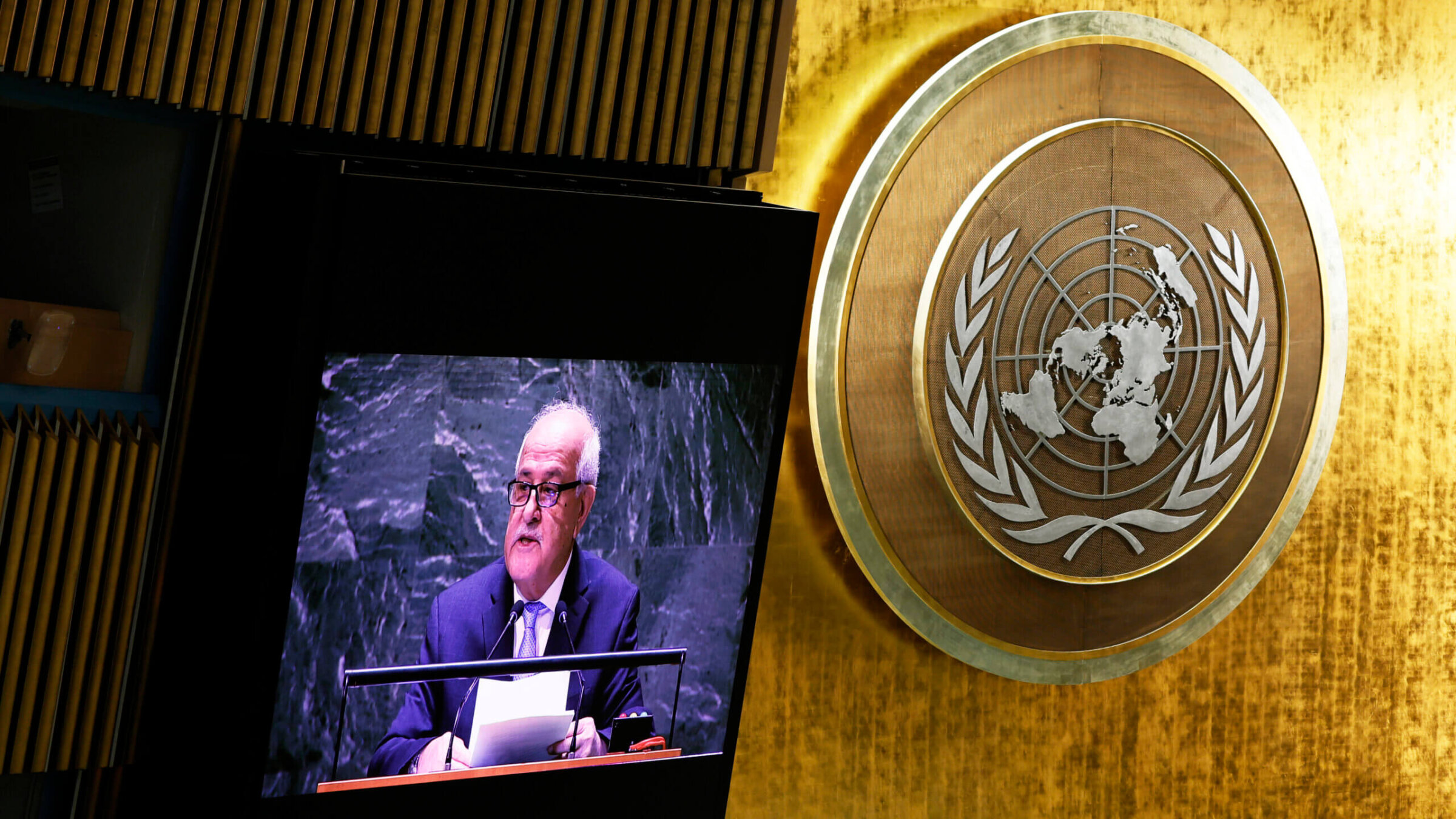UNRWA is just one symptom of the UN’s institutional rot
The international organization has silenced employees who speak out against internal corruption and sexual assault for years

Palestinian Permanent Observer to the United Nations Riyad H. Mansour speaks during the General Assembly at the United Nations headquarters in New York City Nov. 28. Photo by Michael M. Santiago/Getty Images
The United Nations just can’t help itself. On Jan. 26, the United Nations Relief and Works Agency — the U.N. agency for Palestinian refugees —announced it had fired several employees accused of taking part in Hamas’ Oct. 7 terror attack, prompting multiple nations to halt funding to UNRWA, including the United States.
Ordinarily, that U.N. employees participated in the worst massacre of Jews since the Holocaust would come as a surprise. But for an organization as morally bankrupt as the U.N., such allegations are not glitches in the system, but rather the results of years of institutional decay and corruption going all the way up the U.N. hierarchy.
Speak to those who’ve fallen foul of the U.N. system, and you’ll find a familiar pattern: a U.N. employee discovers wrongdoing, speaks out, is punished by their superiors, and ultimately loses their job.
Perhaps the most appalling example of late is the case of U.N. human rights officer Emma Reilly. In 2013, Reilly discovered that, in blatant violation of U.N. rules, her colleagues were giving Chinese authorities the names of Uyghur and other Chinese dissidents set to speak at the U.N. Human Rights Council. China, Reilly explained, “uses that information to … harass these peoples’ families that are still based in China.”
After speaking out against what she calls the U.N.’s “complicity in genocide,” Reilly faced relentless reprisals and intimidation from superiors, forcing her to take the U.N. to its internal employment court. But after Judge Rowan Downing, who oversaw Reilly’s case, criticized the U.N. in his first of three judgments, he was suddenly removed from his position without explanation before he could release his final judgments. In 2021, Downing told me his removal was an “attack upon the independence of the judiciary” and compared it to a “coup d’etat.”
The U.N., for its part, has internally confirmed Reilly’s allegations while strenuously denying them in public. In its letter to Reilly after her 2021 dismissal, the U.N. told her she was not fired for falsely accusing her bosses of complicity in genocide, but for going public with the accusation.
It would be distressing enough if Reilly was the only whistleblower pushed out of the U.N., but she’s only the tip of the iceberg. In 2022, the BBC aired a damning documentary in which it spoke to multiple former U.N. employees who were hounded out of the organization after calling out wrongdoing. Titled The Whistleblowers: Inside the UN, the program featured James Wasserstrom, who worked for the U.N. in Kosovo. After he spoke up about an alleged local kickback scheme linked to U.N. officials, his identity was leaked to those he accused of misconduct.
The documentary also highlights former U.N. employees who were victims and reporters of sexual harassment and assault. “Sexual abuse, exploitation and harassment in the U.N. happens in headquarters, it happens Monday to Friday,” said former Joint United Nations Programme on HIV/AIDS senior advisor Martina Brostrom. While at UNAIDS, Brostrom accused its deputy executive director, Luiz Loures, of sexually assaulting her, and faced what she called “very mean and hurtful” retaliation from the U.N. as a result.
Brostrom is far from the only U.N. employee punished for reporting sexual crimes. In 2015, Anders Kompass was suspended from his U.N. position after giving French authorities an internal U.N. report on French peacekeepers’ sexual abuse of children in the Central African Republic. The report, according to The Guardian, “details the rape and sodomy of starving and homeless young boys by French peacekeeping troops who were supposed to be protecting them at a centre for internally displaced people.”
Perhaps most shocking in all of this is the gall with which the U.N. silences its employees. While still at the U.N., Reilly planned on raising its practice of giving dissidents’ names to China at an online meeting. But as the meeting began, Swiss police arrived at her home and refused to leave. The U.N., Reilly alleges, sent the police, telling them she was a suicide risk. They left, but only once the meeting was finished.
The U.N. was founded, according to its charter, “to reaffirm faith in fundamental human rights” and “promote social progress.” But between rampant corruption and Orwellian-like appointments of Iran to chair the U.N. Human Rights Council Social Forum, it has morphed into an astonishing display of hypocrisy and betrayed values.
Evidently, the U.N. is less a global authority on morality than it is a textbook case for destroying an institution’s credibility. As Peter Gallo, who for four years was an investigator at the U.N.’s New York headquarters, put it, “the organization is riddled with corruption from bottom to top.”
Responding to allegations against UNRWA employees, Reilly noted on X that “from complicity in genocide to child rape,” the U.N. “will always lie and defame unless and until a powerful member state looks at the evidence and cuts funding.” Whether world leaders have the willpower to force meaningful reform within the U.N. is one question. Whether the U.N. is even capable of fixing itself is another. But until that reform occurs, the U.N. must be seen clearly, not as the intergovernmental organization dedicated to peace as it was intended to be, but a bastion of corruption and immorality.
To contact the author, email [email protected].















